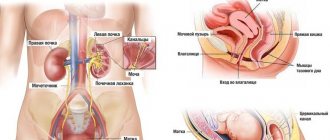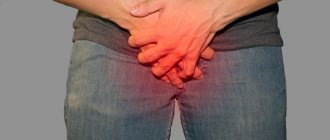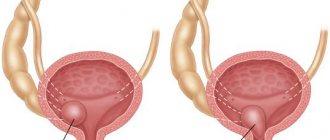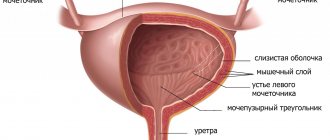It happens that when experiencing a strong urge to empty the bladder, a person produces very little urine; the reasons for this phenomenon remain unclear. If repeated regularly, urinary dysfunction can cause severe discomfort. That's why it's important to figure out why this happens.
A small amount of urine is often a consequence of insufficient fluid intake, however, the problem should not be ignored, especially if this happens regularly. Impaired urine formation can be a signal of the occurrence of serious diseases and pathologies of internal organs. By paying attention to the alarming symptom in time, you can protect yourself from a large number of related problems.
Symptoms and diagnosis of the disease
Rare urination in men and women is not considered by everyone as a problem until obvious signs of pathology appear. Among the secondary symptoms of the disorder can be noted the appearance of:
- painful phenomena during urination or pain after the outflow of urine stops;
- sensations of incomplete emptying of the bladder;
- constant or periodic aching pain in the lower abdomen;
- in urine mucous or bloody discharge.
If the amount of urine excreted is less than normal, but the person does not experience any unpleasant symptoms, it is necessary to be examined. This phenomenon can be either a variant of the norm or the development of a pathological process, which can be asymptomatic for some period of time. Unfortunately, this is often observed with cancer.
Before going to the doctor with suspected insufficient urine output, you can perform a simple test at home. To do this, it is necessary to measure the amount of liquid consumed throughout the day (including liquid first courses, juices, hot drinks, etc.) and the amount excreted, collecting it each time in a suitable container. If the collected urine is 20–30% less than the liquid consumed, then we can talk about the complete health of the urinary system. If there is no more urine, you should consult a specialist.
When contacting a specialist, the patient will be diagnosed. Initially, this will be a collection of symptoms, including the presence of some additional factors that reduce urination (vomiting, diarrhea, high body temperature, etc.). The specialist will also conduct an examination of the pelvic organs using ultrasound, computed tomography and cytoscopy. The laboratory will examine blood and urine to identify bacterial flora and the presence of an inflammatory process.
When you need a doctor's help
A pregnant woman is advised to consult a doctor if frequent urination is accompanied by characteristic symptoms. We are talking about elevated body temperature, pain, pain and discomfort. The release of urine in a volume of a few drops should also alert a woman. The listed signs indicate the development of a pathological process in the genitourinary system.
It is possible to prevent complications during pregnancy. It is enough for the expectant mother to closely monitor her health and see a specialist. If you experience any unpleasant sensations, seek help from a doctor.
Strangury
Strangury - difficulty urinating in combination with its frequency and pain - can be very painful. This term defines conditions when the patient experiences spasmodic, sharply painful contractions of the bladder (tenesmus), either fruitless or accompanied by the release of an extremely small amount of urine. The painful urge to urinate is almost constant, the release of urine does not bring relief, and there remains a feeling of incomplete emptying of the bladder.
Strangury is observed in diseases accompanied by involvement of the bladder neck in the pathological process, with cystitis, prostatitis, vesiculitis, bladder and urethral stones, tuberculous or tumor lesions of the bladder neck, prostate gland, seminal vesicles.
Rare urination in men
As a rule, rare urination in men is observed with kidney failure, urolithiasis, inflammatory processes in the genital organs, tumors in the genitourinary system, heart problems, high blood pressure, diseases of the brain or spinal cord.
For example, rare urination with pain, cramps and spasms in the lower abdomen can be caused by narrowing of the urethra, hyperplasia, adenoma or malignant tumor of the prostate gland. However, most often in these cases, ischuria is diagnosed - urinary retention due to the inability to completely empty the bladder.
- Why is there little urine when urinating in women?
Indirect factors that disrupt the normal process of urination can be alcoholism (causing cirrhosis of the liver), abuse of diuretics, intensive antibiotic therapy, nervous strain, etc.
Inflammatory processes in the urinary organs
Such inflammation most often has an infectious nature. Unpleasant sensations arise due to swelling of the mucous membrane and irritation by urinary current. The course of the acute disease is accompanied by sharp pain at the end of urination, accompanied by a burning sensation. When the disease develops into a chronic form, the discomfort becomes nagging and aching.
Painful symptoms occur in the lower urinary tract with the following diseases
:
- . With this disease, the mucous membrane of the bladder becomes inflamed. Causes cystitis streptococcus, as well as infections that are sexually transmitted. The disease is more common in women;
- urethritis
. Inflammation of the urethra occurs. The disease is caused by the same pathogens as cystitis, but it is more common in men.
Possible reasons
The bladder capacity is designed to hold up to 300 ml of urinary fluid. The medical term for the causes of rare urination in both women and men is oliguria. This process of formation and excretion of urine directly affects the vital activity and state of comfort of the whole organism. Any disturbance in the urinary system indicates the presence of a hidden disease.
In inflammatory processes of kidney disease or insufficient fluid intake, as well as in cases of dysfunction of the spinal cord, rare urination develops.
The main reasons may be:
- heart failure;
- cystitis;
- urolithiasis type;
- renal failure;
- multiple sclerosis;
- hormonal imbalances;
- changes in the total volume of circulating blood;
- thyroid disorder;
- malignant neoplasms;
- nephrotic syndrome;
- blockage of the urinary tract;
- diseases of the endocrine system;
- pathologies of neurological type;
- violation of metabolic systems;
- renal disease of the immune-inflammatory type;
- menopause (for females);
- adenoma (for the male half);
- disruption of brain function;
- dehydration of the body;
- disorders of the cardiovascular system;
- various diseases transmitted through sexual intercourse.
The presence of additional symptoms may indicate the presence of a serious illness:
- increased body temperature;
- discharge of blood drops when urinating;
- nagging pain;
- pain in the abdominal area.
Urinary disorders in pregnant women
Low urine output during urination in women is often observed during pregnancy - almost every expectant mother faces this problem. As the fetus begins to develop, it puts pressure on the internal organs. In urology, there are two types of delay: complete and incomplete.
Incomplete is characterized by a decrease in the volume of urine excreted. A small part of it comes out, and a large part remains in the urine. If the disorder is not corrected in time, it can become chronic. At the same time, a woman may not notice any problems, especially in the first trimester. Signs of pathology in later stages, especially in the morning, include uncontrolled fluid secretion (which causes the underwear to become wet), as well as pain during bowel movements, when urine begins to come out in a thin stream.
- Difficulty and intermittent urination in men: causes and what to do
Complete retention is the absence of urine, even when you may want to go to the toilet for a long time. In this case, the pregnant woman experiences sharp pain in the lower abdomen, sometimes itching, which intensifies with movement, especially in the morning. Added to this are headaches, nausea and vomiting. Swelling often appears.
Possible causes of dysuria in pregnant women:
- pressure on organs from an enlarged uterus;
- chronic diseases, such as kidney problems;
- sedentary lifestyle;
- stress that led to bladder spasm.
A dangerous disorder is intoxication, which threatens both mother and child. To establish an accurate diagnosis and prescribe treatment, tests and ultrasound are performed. Then the doctor recommends treatment (including medications) that can solve the problem.
Treatment
First of all, to eliminate acute urinary retention, catheterization is used - in emergency cases to facilitate the passage of urine. The consequences of frequent use of this procedure are that the bladder gradually becomes detrained. To prevent this from happening, doctors prefer conservative treatment. Among the effective procedures, a sitz bath should be noted. The doctor prescribes its duration and temperature individually. Compresses on the bladder area also help.
Treatment of neurogenic causes of rare urination is carried out only after appropriate diagnosis in a clinical setting. Surgical intervention is prescribed if the measures described above are ineffective. Men and women are recommended to perform exercises to train the muscles of the perineum. It is important to follow a diet: consume as little food as possible that can irritate the urinary tract, limit the amount of kitchen salt and drink more water.
Dysuria requires timely treatment. It leads to infectious and inflammatory diseases of the excretory system. Prolonged urinary retention causes an increase in the amount of toxic substances in the blood and can be fatal.
Oliguria is a condition when there is a decrease in the amount of urine excreted to half a liter per day or less. A similar symptom can occur with poisoning, diseases of the urinary system, as well as with tumors in the kidneys and metastases of the ureters. A deeper pathological syndrome is anuria, in which no urine is produced at all.
Risk factors
In addition to all of these diseases, risk factors for oliguria include increased secretion of the pituitary hormone vasopressin (antidiuretic hormone, ADH), a physiological regulator of water excretion by the kidney. Disruption of its production can occur due to lesions of the hypothalamus and pituitary gland: tumor formation, traumatic brain injury, infectious inflammation (meningitis or encephalitis), congenital anomalies (hydrocephalus, cerebellar atrophy, etc.), pathologies of the peripheral nervous system.
There is also a high likelihood of this urinary function disorder occurring in cases of cancer that affects the lungs, thyroid gland, genitourinary organs of men and women, gastrointestinal tract and pancreas; for Ewing's sarcoma and leukemia in children and adolescents.
Diuresis may decrease while taking medications such as anticholinergic and antihypertensive drugs, loop diuretics, aminoglycoside and quinolone antibiotics, nitrofuran derivatives, antitumor drugs (Methotrexate, Cisplatin, Alvocidib, etc.).
Nonsteroidal anti-inflammatory drugs (NSAIDs) inhibit the renal synthesis of vasodilatory prostaglandins, and their use in children with fever and intercurrent dehydration has been associated with acute oliguria.
[16], [17], [18], [19], [20]
Traditional methods of combating pathology
In most cases, children suffer from oliguria for the same reasons as adults. However, there are several special cases that are worth paying attention to.
In the first days of life, a small amount of urine in children is considered normal. The child’s body is just beginning to adapt from one environment to another, the kidneys are not working properly, moisture evaporates through the skin, and he does not want to pee a lot.
Lack of nutrition
In infants, in turn, oliguria may indicate that they are receiving less food than they need. There may be a lack of breast milk, insufficient fat content, or improper capture of the nipple alveolus. It is worth thinking about feeding your child with artificial formulas and consulting with your doctor.
Cloudy urine in women
Another reason why children’s kidneys produce insufficient amounts of urine is failure to comply with normal drinking regime. Children who cannot ask for a drink themselves may experience a lack of water in the morning after sleep, in hot weather, during long walks and stress. Parents should be especially careful this summer. It will be useful to use simple diapers instead of diapers from time to time.
Older children quite often encounter a phenomenon in which urine cannot be excreted in normal quantities due to taking medications that are dangerous to them. The list of such drugs is quite extensive. Includes more than fifty types of medications, among which the most numerous is the group of beta-lactam antibiotics. Antibiotics are followed by drugs based on chloramphenicol and isoniazid, which have a more gentle effect.
Diagnostics
The doctor can tell why a person has problems with urination after carrying out the necessary diagnostic procedures. A preliminary physical examination is required, during which the doctor must find out the following:
- How long ago did this symptom begin to appear?
- what additional signs are present;
- Do you have a history of chronic diseases of the genitourinary system;
- whether the patient has previously taken any medications or undergone surgery on the genitourinary system.
The following laboratory and instrumental research methods can also be carried out:
- general clinical analysis of urine and blood;
- vaginal smear for bacteriological examination;
- Ultrasound of the genitourinary system;
- X-ray examination of the abdominal organs.
Depending on the current clinical picture and the history collected during the initial examination, the diagnostic program may change.
What is anuria?
The condition is characterized by a small volume of urine (value less than 50 ml/day) or a complete cessation of excretion. Usually the problem lies in the ureters, since it is the disruption of their activity that makes it difficult for urine to enter the bladder.
Absence or decreased urination occurs when:
- removal of a kidney or congenital absence of this organ,
- hemolysis, myolysis,
- glomerulonephritis, pyelonephritis, including chronic, nephritis,
- the presence of stones that interfere with the outflow of urine,
- acute heart failure,
- hemorrhagic fever,
- tumors,
- CRF (chronic renal failure),
- poisoning with toxic substances,
- intersection of the ureters during surgery.
Anuria is possible if there is an allergic reaction to any product/component.
Signs of pathology at first are often completely absent, then thirst, loss of appetite, nausea, and vomiting appear. Over time, a headache begins, drowsiness, fever are observed, and in rare cases a person can fall into a coma.
Anuria and its symptoms require immediate treatment, as it can lead to uremia, when protein metabolites accumulate in a person's blood. This condition can be fatal in some cases.
Determining the risks and degree of danger of anuria is carried out using ultrasound examination of the urinary tract and a general blood test. Patients also undergo computed tomography of the retroperitoneal space and cystoscopy; such diagnostics provide the clearest prognosis for the development of the existing pathology. The doctor prescribes diuretics, a nephrostomy, and in severe cases, transfers the patient to an artificial kidney for a long time.
Epidemiology
According to expert estimates from the Centers for Disease Control and Prevention (USA), oliguria affects people of all ages, but is more often detected in newborns and early childhood - due to comorbid conditions and high morbidity, leading to dehydration. It is diagnosed 11.5% more often in male patients.
In terms of frequency, the diagnosis of “anuria and oliguria” ranks seventh in the list of symptoms associated with urinary problems, and is in second place among the most dangerous signs of nephrological and urological diseases.
According to data published in the International Society of Nephrology, the incidence of oliguria and decreased urine output varies widely depending on the clinical situation. In North America, this symptom is recorded in approximately 1% of adult patients of urologists and up to 5% during hospitalization.
Acute renal failure with oliguria is detected in almost 10% of patients in the neonatal intensive care unit, and after cardiac surgery it reaches 15-30%. Moreover, more than two thirds of patients with a history of rare urination did not meet the criteria for serum creatinine levels. And only a decrease in urine output, which is observed in more than half of patients in critical condition, predicted a significantly higher risk of death.
According to official statistics, in 2020 in the United States, two patients died from acute oliguria, and the death of 683 patients with severe clinical disease became inevitable due to deterioration of the condition due to a reduction in the volume and frequency of urine output.
[9], [10]
Preventive recommendations
To prevent urinary retention, women are advised to:
- promptly diagnose and treat urinary tract infections;
- avoid stagnation of urine, urinate on time;
- visit a gynecologist at least 2 times a year;
- eat right to prevent salt deposition and the development of urolithiasis;
- take medications only as prescribed by a doctor;
- adhere to a drinking regime of at least 1.5-2 liters per day.
Urinary retention in women indicates a dysfunction of the urinary system. It can be caused by various reasons. It is necessary to ensure normal urine flow as quickly as possible and eliminate the root cause. Prolonged stagnation of urine in the bladder can lead to irreversible processes, loss of organ functionality or more serious complications.
Doctors consider monitoring the volume of fluid consumed and urine output to be the main way to prevent oliguria. In addition, you will need to monitor urine indicators, which include odor, color, clarity and consistency. In addition, it is important to provide timely treatment for infectious and inflammatory diseases and to observe the rules of personal hygiene.
Oliguria
Oliguria is abnormally infrequent urination when the amount of urine produced is normal (can only be explained by an abnormally large bladder capacity). If at the same time the bladder is completely emptied with each urination, one can think about individual characteristics, but more often a significantly increased capacity of the bladder, when the urge to urinate occurs with a “delay,” requires a search for the cause of the disturbance in the innervation of the bladder. This may be the result of damage or disease, resulting in the development of an atonic neurogenic bladder.









